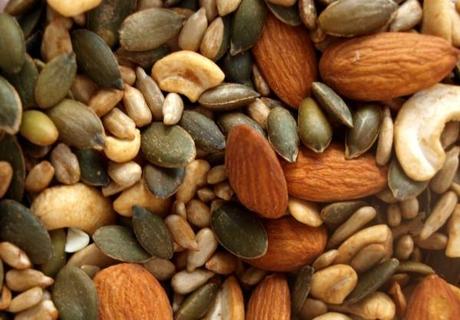
Here’s what you need to know in order to get more good stuff – straight from Mother Nature – into your diet.
Nuts
Many people think that nuts can add fat to their diet and avoid them for this reason. However, contrary to popular belief, nuts actually contain good fats that can improve health. One of the biggest perks of incorporating nuts into your diet is that they are heart healthy and can help lower bad cholesterol. Nuts contain lots of healthy goodness, like unsaturated fats (the good fats), fiber and vitamin E. But beware. Though nuts are packed with nutrients, the serving size and serving manner are important. A few nuts can be a great snack but a whole bowl is usually too many calories to add to the day’s tally. Also, tasty nuts can become quite unhealthy when they are covered with sugar, salt, and other less attractive additives.
Almonds, cashews and pistachios top the list of healthiest nuts to snack on, as far as calorie counts go. They have fewer calories than some of their nut relatives, making them a safer snacking option that will still stave off hunger until your next meal. If you’re looking for nuts that will keep your heart in good shape, walnuts are a great choice. They contain the omega-3 fats that are good for heart health, as well as alpha linoleic acid, which can help with heart arrhythmia and keeping arteries healthy after eating a fattening meal. Peanuts, though not technically nuts (they’re legumes), are one of the best brain health “nuts.” Their unique quality is that they contain a good amount of folate, a mineral that helps the brain develop and can keep it from deteriorating.
One of the all-around healthiest nuts is the almond. Almonds have more calcium than any other nut and are relatively low in calories, making them ideal for snacking and adding to other dishes. Almonds also contain all the other nutrients common to nuts, making them an action-packed snack.
Seeds
Most of us have heard lots of hype about why this or that seed is the hip miracle food essential to your diet. But the secret behind their super-powerful effects is simple and intuitive. Since seeds are the blueprints for any one of a variety of plants, they contain all the ingredients required to nourish and grow into a plant. Thus, they are packed full of nutrients that people can take advantage of even before they are planted, solidifying their status as super foods. These unassuming little guys are chock full of all kinds of good things, like healthy fats, fiber, iron, zinc, protein, and minerals. So what seeds should you eat to start taking advantage of what they have to offer?
Chia seeds have become quite popular lately and for good reason. They’re versatile and super healthy too. These tiny seeds can be added to all kinds of dishes, like smoothies, juice, and salad dressing. Soaking the seeds in a liquid puffs them up and they become more filling when eaten. They also have 10 grams of fiber in just one teaspoon, along with many of the other nutrients common to seeds, often equaling the amount of nutrients in full servings of other healthy foods. Milling seeds can help unlock their full benefits, especially as the body is unable to break down some whole seeds.
Flax is another popular health food seed that has become more prevalentin recent years. Little flaxseeds can be sprinkled on or mixed into all kinds of foods. They offer fiber as well as functioning as a laxative, cancer deterrent, lowering blood pressure, and possibly even lowering cholesterol and reducing hot flashes. Make sure to eat them already ground into flaxseed meal to get the full benefits.
The limits of using seeds in cooking are only bound by the imagination. Check online for different recipe substitutes (flaxseed and water can even stand in for eggs in some recipes) and use your imagination to blend them into your daily life. Sunflower seeds, pumpkin seeds, hemp seeds and sesame seeds are more great options to incorporate into your diet. Keep seeds stored in a cool, dry place to make sure they don’t go rancid, as they are wont to do.
Berries
Last but not least are berries, the only fruit of the group. Most of us have heard that berries are rich in antioxidants, but what do these magical sounding nutrients actually do? Antioxidants help protect the body from free radicals which can play a part in causing heart disease and cancer. This makes berries, which also contain nutrients that keep the brain in good shape, skin healthy and reduce the risk of certain diseases, all around great foods for health. Like nuts and seeds, berries are also easy to incorporate into a healthy diet. Many people love them for their natural sugars and sweetness, as well as rich flavors. Incorporate them into smoothies, on salads, or mixed into baked treats. Don’t forget about the versatility of dried berries and juices too, whether added to trail mix, in cookies, or on their own.
There are not many losers in the berry world but there are a few clear winners.
Blueberries have more goodness in one little sphere than seems possible. They have manganese, which gives you a shot of energy, fiber, necessary for all-around health, and vitamin K, which is good for bone health. But the benefits don’t end there. These berries can even have such far-reaching effects as improving motor skills.
Cranberries are another easy to eat berry that have a wide variety of health benefits within their tiny skin. The unique appeal of cranberries is that they contain proanthocyanidins, a long word with an important function: urinary tract health.
If you’re looking to affect a specific part of your health, look into what berry may cater to that area. Otherwise, dig into a wide variety of berries and enjoy the delicious goodness.
Be Sociable, Share
